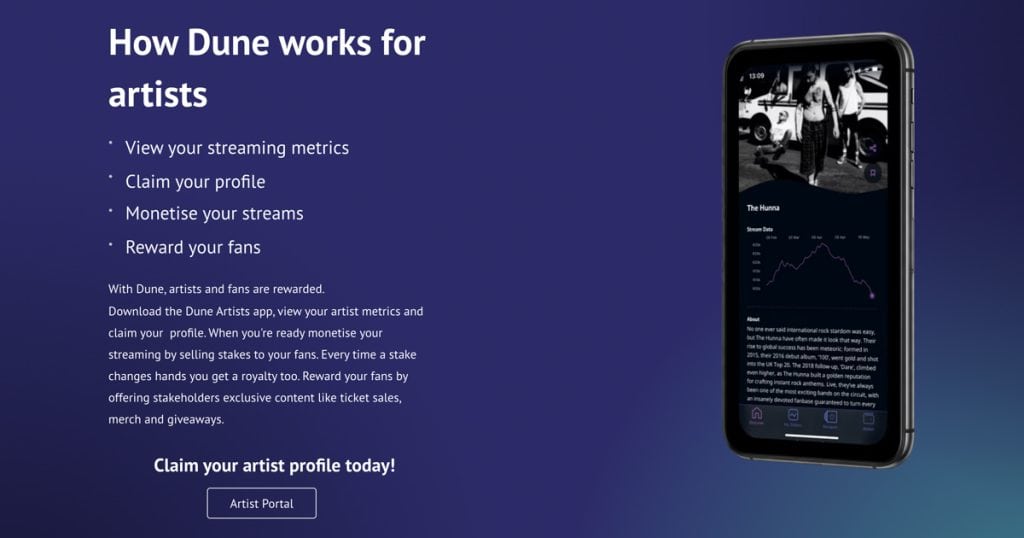Introducing Dune: a New Music Startup Letting Fans Own Stakes in Artists
A new UK-based app, Dune, is raising seed funding to build a marketplace where artists and fans can connect with revenue-generating opportunities modelled after stocks.

A New Way to Invest in Music: Dune Raises Millions to Let Fans Own Stakes in Artists
Dune — a startup building a marketplace where fans can buy “stakes” in artists — is in the process of raising £2 million in seed funding. The company plans to use the new capital to expand its platform and bring the concept of fan-invested artist ownership closer to reality. If you’re a fan who wants to go beyond streaming and merch, or an artist searching for fresh ways to connect with supporters and fund your work, this is a story worth paying attention to.
How This Works
Dune is positioning itself as a kind of “stock market for artists.” Fans can purchase digital stakes in an artist’s career, with each stake’s value tied to that artist’s streaming performance. The prices fluctuate based on real-world data, updated daily, but the platform includes mechanisms to prevent extreme volatility.
These stakes aren’t merely symbolic. Holders may gain access to unique perks such as early ticket sales, exclusive content, or limited-edition merchandise. In essence, fans aren’t just investing money — they’re investing belief and participation in the artist’s growth.

Why This Matters for Fans
For music fans, Dune changes the experience of supporting an artist. Instead of simply streaming songs or buying a T-shirt, fans can now take on a more active, ownership-based role, and one that’s immersive and participatory. It allows listeners to share in an artist’s journey both emotionally and financially. As their favorite artists grow and gain traction, the value of those stakes can rise as well, creating a sense of shared progress.
It’s also about connection. Depending on the artist’s use case, stakeholders might receive early access to tickets, special releases, or direct communications — experiences that go beyond passive consumption.
Why This Matters for Artists
For artists, Dune introduces a modern funding alternative. Rather than depending solely on traditional routes like label advances, streaming income, or touring, artists can raise capital directly from the community that already believes in them. It’s a form of empowerment that keeps ownership in the artist’s hands while offering fans a tangible stake in the journey.
The system also creates a feedback loop of fan loyalty by encouraging advocacy and aligning incentives. Fans want to see the artists they’ve invested in succeed, and now they can earn when that happens as well.
For independent musicians in particular, this could be a powerful new tool. Instead of chasing short-term metrics or fitting into label expectations, they can grow sustainably with the backing of their true believers. This model offers a new way to fund creative projects while building a closer relationship with the people most invested in an artist’s success.
Conclusion
With streaming economics continuing to face scrutiny from artists calling out low per-stream payouts and opaque payment structures, fan-driven revenue models like Patreon, members-only clubs, and NFTs, have gained traction as ways to supplement income and engage more directly with one’s community. Dune is trying to position itself at the intersection of these trends, blending investment mechanics with fan engagement in a way that feels both futuristic and personal.
It also fits squarely within the growing “superfan economy.” Artists and platforms alike are realizing that a small but deeply committed audience can be more valuable than a massive but passive one. By offering real participation instead of passive consumption, Dune gives those superfans a reason to stay active and invested — literally.
Of course, this model raises questions too. How will regulators classify these stakes? How stable will the system be as streaming data fluctuates? And what ethical or creative implications might arise when music and financial speculation start to overlap? The answers to those questions will likely determine how far the idea spreads.
In an era when streaming payouts remain small and touring costs are rising, a platform like Dune might be both a unique source of hope and innovation; but it may also turn out to be another glimmering idea co-opted by major industry players to benefit a select few. Yet the model it’s proposing is surely exciting and empowering.